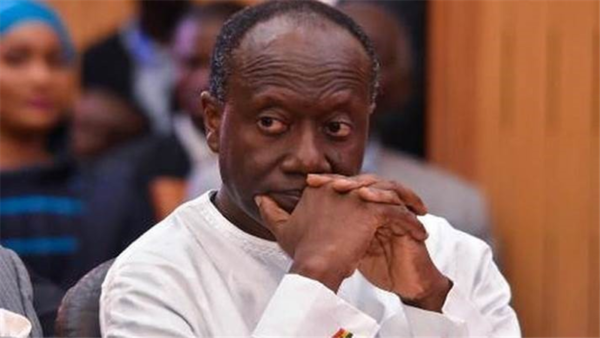
Fitch Ratings has revised its outlook on Ghana’s Long-Term Foreign-Currency Issuer Default Rating (IDR) to Negative from Stable and affirmed the IDR at ‘B’.
According to the rating agency, the revision of the Outlook to Negative reflects the significant deterioration in public finances stemming from the Covid-19 pandemic and the delays to the government’s fiscal consolidation efforts, which reduce Ghana’s ability to absorb further shocks for an extended period.
Moreover, in our view the lack of a clear majority in parliament following the December 2020 elections increases the risk of fiscal slippages,” it stated on its website.
The ‘B’ rating reflects the high public debt level and low revenue base, which mean that Ghana’s debt affordability metrics will remain markedly weaker than rating peers over the rating horizon. This is balanced against Fitch’s expectation of a recovery in economic performance and a stabilisation of debt/GDP and the ready availability of external and domestic financing.
It further stated that the public finances remain the key rating weakness for Ghana. After achieving a general government deficit on a commitment basis below 5% of GDP in the three years prior to 2020, the deficit widened to 11.5% of GDP following the approval of a mid-year supplementary budget that contained an additional 3% of GDP in Covid-19-related spending.
According to Fitch, when arrears clearance and support for the financial and energy sectors is added, the cash deficit reached an estimated 14% of GDP.
We forecast a significant fall in the cash deficit to 8.3% of GDP by 2022, but this remains well above the 2022 ‘B’ median of 4.8%. Post-pandemic recovery spending will keep government expenditure high compared with historical levels. We expect a recovery in government revenue, but note that Ghana has structurally low domestic revenue mobilisation when compared with peers.
Ghana continues to deal with the legacy of domestic payment arrears built up prior to 2017 and from contingent liabilities in the energy sector, which will contribute to higher cash deficits in 2021 and beyond. The full size of unmatched liabilities in the energy sector is unknown.
Fitch however, estimates the current stock at USD3 billion to USD4 billion (2% to 3% of 2021 GDP). Furthermore, the sector continues to build new arrears owing to uneconomical tariff structures and take-or-pay contracts with power producers, although the government is renegotiating these contracts.
the rating agency stated that public sector debt/GDP is likely to plateau over the medium term, but Ghana’s debt metrics will remain weak relative to ‘B’ peer medians.
We forecast general government (GG) debt to reach 81% of GDP in 2021, including 2.5% of GDP in bonds held through the Energy Sector Levy Act Plc., which is excluded by the government. GG debt now constitutes 535% of government revenue, compared with the 2020 ‘B’ median of 304%. Furthermore, an increase in domestic debt issuance has raised the government’s interest spending. Fitch forecasts interest expenditure will rise to 53% of revenue in 2021 before falling below 50% in 2022, compared with a 2022 ‘B’ median of 13.2%.”
Despite the increase in government debt, Ghana has good access to fiscal and external financing. The government issued USD3 billion in Eurobonds in March 2021 and has budget approval to issue an additional USD1 billion, which will be enough to cover the USD3.3 billion in external debt principal and interest payments that we estimate for 2021.
Read also: World Bank: Poor countries must borrow to develop
Domestic debt markets remain liquid and domestic debt yields remained broadly stable over 2020, even as the government increased its domestic issuance. The government placed GHS10 billion (6% of GDP) of debt directly with the Bank of Ghana (BOG), as part of emergency financing measures.
As a one-off reaction to the pandemic, Fitch does not expect this to significantly affect macroeconomic stability, but additional direct financing by the central bank would signal financing stress and could contribute to macroeconomic instability as occurred in the years directly prior to 2017.
Ghana’s GDP growth slowed sharply in 2020 to 0.4%, but Ghana was one of few sovereigns globally to record positive growth. At 4.9%. Ghana’s five-year growth average over 2016 to 2020 was higher than the ‘B’ median of 4.5%.
We forecast a recovery to 5% growth in 2021 and 2022, as base effects help growth in the industrial and service sectors. The agricultural sector saw strong growth through 2020 and we expect this to continue, supporting Ghana’s overall recovery”.
CPI growth slowed to 7.5% yoy in May 2021, down from 11.3% in May 2020. The slowing inflation allowed the BoG to lower the main policy rate by 100bp to 13.5%. The more accommodative monetary policy stance will support near-term growth and help lessen the government’s financing costs. However, administrative price hikes and the fading of base effects will put upward pressure on inflation in 2H21, limiting the BoG’s ability to further lower the policy rate. We forecast 2021 annual average inflation at 9%.
According to Fitch, Ghana’s post-pandemic growth will remain lower than the strong growth experienced in 2017 to 2019, when oil production ramped up to reach almost 200 thousand barrels per day (kbpd) in 2019. Oil production fell to 183 kbpd in 2020 and will likely fall again in 2021. The pandemic has delayed plans to begin drilling on the Pecan field, which could add an additional 100 to 110 thousand barrels per day of production.
We see medium-term growth potential at approximately 5%, although the possibility of an increase in oil production in 2022 does bring some upside growth potential.”
Source: Fitchratings


[…] Read also Fitch Revises Ghana’s Outlook to Negative; Affirms at ‘B’ […]
[…] Read also: Fitch Revises Ghana’s Outlook to Negative; Affirms at ‘B’ […]
[…] Read also: Fitch Revises Ghana’s Outlook to Negative; Affirms at ‘B’ […]
[…] Read also: Fitch Revises Ghana’s Outlook to Negative; Affirms at ‘B’ […]